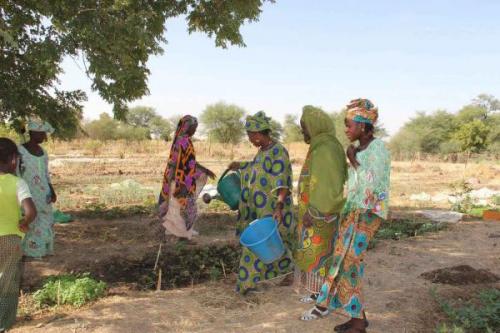UN warns lack of funds threatens response to food crisis in Africa’s Sahel region
Senior United Nations officials today made impassioned appeals to the international community to make more resources available to assist millions of people affected by the severe food and nutrition crisis in the Sahel region of West Africa, cautioning that global inaction could lead to a humanitarian disaster.

Drought in the Sahel region makes farming and gardening very diffcult for the women of Yelimne, Mali.
“We are appealing, all of us, for an end to global indifference that we have found so far,” said Anthony Lake, the Executive Director of the UN Children’s Fund (UNICEF), at a joint news conference in Geneva with his counterparts from the office of the UN High Commissioner for Refugees (UNHCR) and the World Health Organization (WHO).
“I know that there is a certain fatigue. I have read comments in blogs and elsewhere that ‘here we go again; once more a famine; once more African children are dying; once more there is an appeal for help.’
“By acting vigorously and properly now, we can head off future crises… by building now in this crisis, health systems, community nutrition centres, more water bore holes… we can build capacity for the future,” he said.
Mr. Lake, who had just returned from a visit to Chad, noted that of the estimated 15 million people affected by the drought and conflict-related crisis in the region, about 1.5 million are children who face the prospect of severe acute malnutrition.
“I was in a town called Mao in central Chad a few days ago and visited a nutrition centre and they reported that admission rates at the nutritional centre for children suffering from severe acute malnutrition are already higher than at any point in last year’s lean season.
“This could be very bad and we are now across the region entering the so-called lean season, when families are drawing down the grains that they were able to harvest last year, but these families are in particular peril because in the drought of 2010 they had already sold off livestock, taking their kids out of school… therefore they are in a weakened position for this year’s crisis,” said Mr. Lake.
He said UNICEF and partners have been ramping up their response, but needed to accelerate the relief effort further.
UN agencies and partners last December appealed for $724 million to fund the humanitarian response to the crisis in the Sahel, but only 50 per cent of that funding requirement has so far been received, Mr. Lake said.
“To those who are fatigued, we would say that people and children, of course, are not simply statistics. All these are families fighting courageously in circumstances that few of us can imagine,” he said.
He spoke of meeting Fatuma, a young girl in a tent in Chad, who the previous week was among other children who were on the verge of death. “As I spoke to her mother I kept thinking about this not only being a life saved, but this is a whole future that was saved.”
“Let’s not look at them as objects of pity and charity, let’s look at them as people we need to support in their brave struggle for survival,” he said. He stressed that taking action immediately will be more cost-effective than waiting for the situation to deteriorate further.
“In the earthquake in Haiti, and even in the floods of Pakistan, the international community had very little warning. So we had to react as quickly as we could, but almost by definition we were always going to be too late.
“Here we’ve warnings for the last few months. Here we are working to try to stop it from getting worse. Some day there will be no excuse for looking back and saying why did we not do more, more quickly,” said Mr. Lake.
High Commissioner for Refugees António Guterres said the situation in the Sahel was the result of the combined effects of drought, food insecurity, water scarcity, environmental degradation and conflict.
An estimated 250,000 people have been displaced by the political upheaval in Mali, half of the number internally. Some 48,000 sought refuge in Mauritania, 28,000 in Niger and 32,000 in Burkina Faso. A few thousand have gone to Algeria.
“The truth is that there is very little attention to the crisis in the Sahel,” said Mr. Guterres. “Most of the focus of the international community has been on the Syrian crisis.”
He said that too much attention was also paid to the coup and the military situation in Mali at the expense of humanitarian needs, and urged the international community to show solidarity with people in neighbouring countries who are sharing their meagre resources with the Malian refugees. “The response of the international community is very, very insufficient,” he said.
Describing the food and nutrition situation in the Sahel as a public health crisis, Margaret Chan, the Director-General of WHO, urged the world to turn the situation into a window of opportunity to improve conditions there.
“We need to ask ourselves, can we turn this peril into an opportunity? That is why we would like to bring this crisis to the attention of the international community,” she said.
Source: UN NEWS
- 559 reads
Human Rights
Fostering a More Humane World: The 28th Eurasian Economic Summi

Conscience, Hope, and Action: Keys to Global Peace and Sustainability

Ringing FOWPAL’s Peace Bell for the World:Nobel Peace Prize Laureates’ Visions and Actions

Protecting the World’s Cultural Diversity for a Sustainable Future

Puppet Show I International Friendship Day 2020

